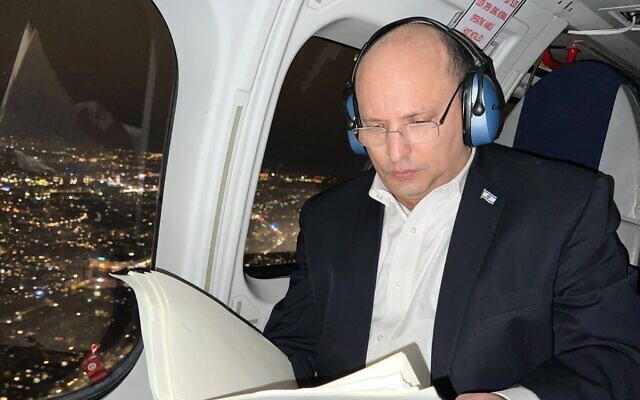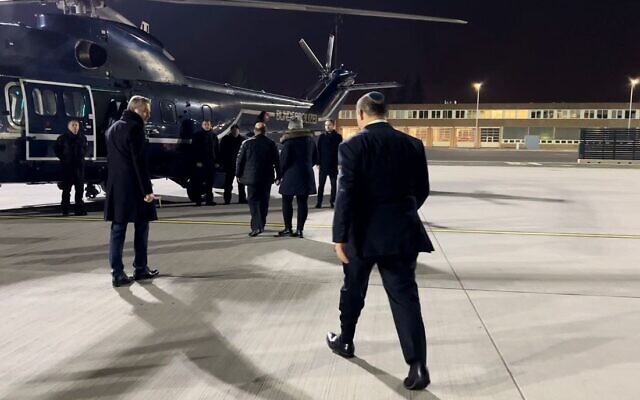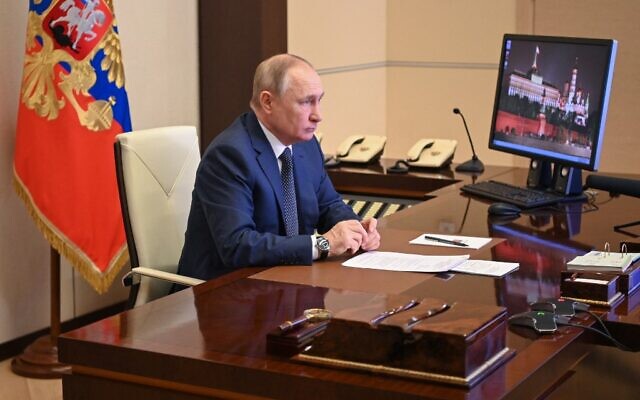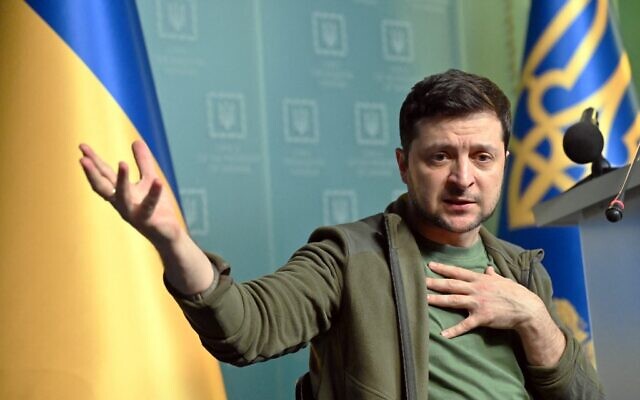Few details provided on content of either sit-down amid PM’s efforts to mediate in Ukraine war; Israeli leader also speaks by phone with Ukraine’s Zelensky and France’s Macron

Prime Minister Naftali Bennett returned to Israel in the early hours of Sunday morning after a surprise whirlwind trip to Moscow and then Berlin to discuss the invasion of Ukraine.
After a three-hour conversation with Russian President Vladimir Putin at the Kremlin, the Israeli leader headed to Germany, where he and Chancellor Olaf Scholz “discussed several issues, including the situation between Ukraine and Russia.”
Few details were provided on the content of either meeting.
Bennett’s trip was seen as an effort to further develop a potential role as mediator between the sides, as Israel has good relations with both Kyiv and Moscow.
Hebrew-language media reports said Bennett also spoke with Putin about the safety of Ukraine’s Jewish communities, and that the meeting touched on the state of nuclear talks with Iran as well.
Bennett also spoke twice throughout the evening with Ukrainian President Volodymyr Zelensky following his meeting with Putin. He also conversed with French President Emmanuel Macron.
Zelensky tweeted that Bennett had called him and “we continue dialogue.”
However, the Ynet news site cited the Ukrainian president’s spokesman as saying it was not yet clear what, if anything, the meeting had achieved in efforts to negotiate an end to the fighting.
Prime Minister of Israel @naftalibennett called me after his meeting with Vladimir Putin. We continue dialogue.
— Володимир Зеленський (@ZelenskyyUa) March 5, 2022
According to the website, Sergey Nikiforov said that in Bennett’s phone call with Zelensky, the Ukrainian leader did not hear anything particularly new.
“We cannot assess the results of Prime Minister Bennett’s mediation until we get a clear indication from Bennett or Putin on an agreement to a meeting [with Zelensky],” he said.
Kyiv had asked Israel to launch a dialogue with Moscow.
After Bennett’s meeting with Scholz, the two agreed their aim was to “end the war in Ukraine as soon as possible,” the German leader’s spokesman said in a statement early on Sunday.
There were conflicting reports on Washington’s attitude toward the meeting with Putin — his first with a world leader since the invasion of Ukraine began.
An Israeli official diplomatic source said the meeting was coordinated with the United States, Germany, and France, “in continuous dialogue with Ukraine.”
Quoting an unnamed source, Axios reported that while the White House had not objected to the meeting, it also doubted Bennett’s chances to influence Putin’s position.

But Channel 12 news claimed the White House had actively supported and encouraged the effort.
Bennett has so far walked a cautious line on the Ukraine conflict, seeking to preserve delicate security cooperation with Russia, which has a large military presence in Israel’s northern neighbor, Syria. Israel regularly carries out strikes in Syria targeting Iran and its proxies.
Bennett has not joined Western leaders — notably key ally the United States — in forcefully condemning the invasion, instead stressing Israel’s strong relations with both Russia and Ukraine. Still, Israeli diplomats have condemned the invasion, and Jerusalem this week voted in favor of a UN General Assembly resolution against Russia’s actions.
Ahead of the trip, Bennett had spoken by telephone repeatedly with both Putin and Zelensky — who is Jewish, has family in Israel and has visited the country many times.
“Bennett’s action is bold but also risky. Much will depend on Putin’s state of mind,” Michael Oren, former Israeli ambassador to Washington, told AFP.
Oren noted that while Putin rebuffed heavyweight diplomatic outreaches before the invasion, “Russia is in a different position today and Putin may be looking for a way out of his predicament. Naftali Bennett just may supply the ladder.”
Bennett’s office said he left Israel for Moscow early Saturday, itself an extraordinary move for a religious Jew who does not conduct state business on the Jewish Sabbath, except in extraordinary circumstances.
Kremlin spokesman Dmitry Peskov said Bennett and Putin discussed “the situation around Ukraine,” according to Russian news agencies.

An Israeli official diplomatic source said Bennett spoke with Putin about “the situation of Israelis and the Jewish communities as a result of the conflict” and the ongoing talks in Vienna to restore the 2015 Iran nuclear deal, which Russia is a signatory to.
“The prime minister expressed the position of Israel, which is opposed to a return to the nuclear deal,” the source said.
Earlier Saturday, Russia said it would demand guarantees from the US before backing the Iran nuclear deal, citing the current wave of Western sanctions against Russia.
There was no immediate comment on any link between the new Russian position and Bennett’s visit.
Bennett’s office said the premier was accompanied by Housing Minister Ze’ev Elkin, acting as a translator and adviser. Elkin, a Russian speaker and native of Ukraine, served a similar role under former prime minister Benjamin Netanyahu.
National Security Adviser Eyal Hulata, senior policy adviser Shimrit Meir, and Bennett’s spokesman Matan Sidi also traveled with the prime minister, his office said.
The trips to Moscow and Berlin came after Bennett held two back-to-back phone calls with Putin and Zelensky in recent days, as Moscow pressed on with the invasion of its neighbor.

On Tuesday, Bennett said that Israel was seeking to “help quietly” while maintaining its own strategic interests. Israel has expressed its support for the Ukrainian people and has sent a shipment of 100 tons of humanitarian aid. Foreign Minister Yair Lapid condemned the invasion as a “breach of the international order.”
But Bennett has avoided calling out Putin by name, refused Ukrainian requests for military equipment, and vowed to stake out a cautious policy.
Russia and Ukraine are expected to hold a third round of talks to end hostilities on Monday. The first two rounds of talks on resolving the Russia-Ukraine war produced no breakthrough, though the two sides agreed to meet again.
As reported by The Times of Israel
